Reply To:
Name - Reply Comment
Last Updated : 2024-04-20 00:00:00
Experts raise alarm on 20th Amendment
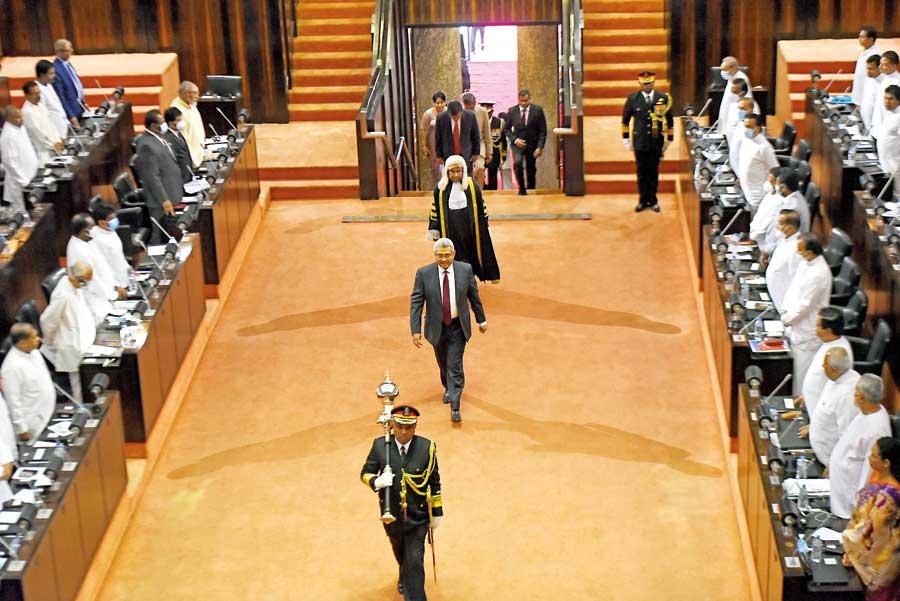
President Gotabaya Rajapaksa entering Parliament to deliver policy statement on August 20, 2020
- This is a Government by a single leader or small group who have absolute power
- It is the people who headed the government who failed when the Easter Sunday attacks occurred
- Entities like the Election and Bribery Commissions must have independence as a core fundamental feature
- There is a view in society that the 225 Members of Parliament are useless or that Parliament should be bombed. People should realise these are citizens of Sri Lanka, not dual citizens
An all-powerful presidency is set to be established with the proposed 20th Amendment (20A) to the Constitution according to political experts. The amendment not only weakens Independent Commissions but also subordinates the powers of the Prime Minister and Parliament to the President. In this light, Daily Mirror got the views of political analysts and legal 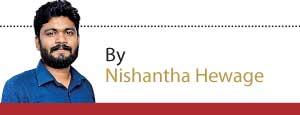 experts on 20A and its implications.
experts on 20A and its implications.
Power consolidation
Executive Director of the Centre for Policy Alternatives (CPA) Dr. Paikiasothy Saravanamuttu said 20A reversed the 19th Amendment (19A) and paved the way for an authoritarian government. Commenting on the President’s power to dissolve Parliament after one year of elections, Dr. Saravanamuttu noted 20A stripped the Prime Minister’s role. He added 20A was designed to consolidate power in the office of the Executive President. “It is about consolidating power in one office. This goes against the principles of parliamentary democracy and power sharing. There is no accountability or transparency. It’s a terrible blow to the advances made in 2015 to strengthening parliamentary democracy,” he noted.
Referring to state institutions, Dr. Saravanamuttu said these institutions should be non-partisan. “They are not supposed to be the stronghold of a political party. When you set up a 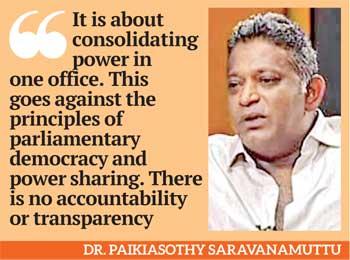 Parliamentary Council made up of three people from the Government and two from the Opposition, you are subjecting it to political control. There are no checks or balances in the exercise. The whole question of the immunity of the Constitution also prevails.”
Parliamentary Council made up of three people from the Government and two from the Opposition, you are subjecting it to political control. There are no checks or balances in the exercise. The whole question of the immunity of the Constitution also prevails.”
Autocracy and immunity
Senior political scientist Prof. Jayadeva Uyangoda warned 20A could spell the end of democracy in Sri Lanka. “Sri Lanka’s democracy has had a series of ups and downs. But there was a basic trend in recent years that Sri Lanka’s democracy should at least be a parliamentary democracy. The Executive should not be above either the Legislature or the Judiciary. The Executive should be accountable or answerable to the Legislature,” he said. Prof. Uyangoda noted Parliament should be the main institution of governance as it represented the sovereignty of the people. “There should be checks and balances on the Legislature as well as the Executive. There should be a limit to political power. 20A seems to have followed the model of the colonial state we had in Sri Lanka before 1931,” he added.
Prof. Uyangoda said 20A could lead to a system of autocracy, but stopped short of calling it a dictatorship. “I would not use the word dictatorship. I would say it creates a system of 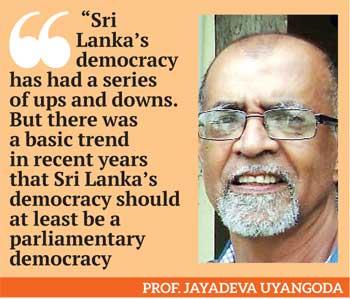 autocratic government. This is a Government by a single leader or small group who have absolute power. I don’t know whether people have really understood what this means to them. Unfortunately they will realise it after a couple of years, when they suffer the consequences of such a political change. It would be a very costly learning process,” he warned.
autocratic government. This is a Government by a single leader or small group who have absolute power. I don’t know whether people have really understood what this means to them. Unfortunately they will realise it after a couple of years, when they suffer the consequences of such a political change. It would be a very costly learning process,” he warned.
When asked if national security concerns had given rise to 20A, Prof. Uyangoda said both internal and external security was important to a country. “It is not that 19A compromised national security. It is the people who headed the government who failed when the Easter Sunday attacks occurred,” he opined.
He noted President Gotabaya Rajapaksa had been functioning under 19A from November 2019 to date, with some deviations. “For nearly one year, he has been running the country under 19A. But I don’t think a significant argument can be made that 19A was an obstacle to the exercise of Executive power, although Gotabaya Rajapaksa had deviated from the framework of 19A. A lot of people do not make the distinction between the Constitution and the individuals who run the Government. What happened under 19A with regard to national security? It is the people who were in charge of national security at the time and the security apparatus that existed at the time,” he emphasised. “It is not the fault of the Constitution, but the fault of the individuals who handled national security and defence at that time.”
Legal academic of the Open University of Sri Lanka (OUSL), Prof. Camena Guneratne said 20A removed the checks and balances on Presidential powers introduced by 19A, and paves 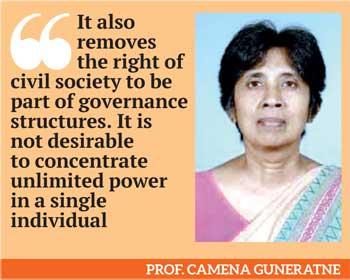 the way for authoritarian rule. “It also removes the right of civil society to be part of governance structures. It is not desirable to concentrate unlimited power in a single individual,” she said. Prof. Guneratne added this would give the President immunity in exercising his powers and deprive citizens of a remedy for the negative consequences of Presidential actions for violations of Fundamental Rights (FR), including issues like environmental harm.
the way for authoritarian rule. “It also removes the right of civil society to be part of governance structures. It is not desirable to concentrate unlimited power in a single individual,” she said. Prof. Guneratne added this would give the President immunity in exercising his powers and deprive citizens of a remedy for the negative consequences of Presidential actions for violations of Fundamental Rights (FR), including issues like environmental harm.
Independent Commissions
Executive Director of Transparency International Sri Lanka, Asoka Obeyesekere said there were key accountability gaps that emerged from 20A. “These include preventing the Election Commission from providing guidelines on the administration of public services during election periods, large-scale reductions in financial oversight by the Auditor General, the Bribery Commission losing powers to proactively commence investigations and very significant implementation challenges that could emerge for citizens when using their Right to Information (RTI).” He said entities like the Election and Bribery Commissions must have independence as a core fundamental feature. He opined that entrusting the power of appointment to such institutions to the sole discretion of any individual would compromise the separation of powers, which would not be a good constitutional arrangement.
Mr. Obeyesekere added, the proposed 20A afforded the President immunity from FR applications, and the necessity for this should be justified and explained to the public. “Having witnessed this FR jurisdiction being used by families of the victims of the Easter attacks to attempt to hold the former President and Prime Minister accountable, removing such a right from 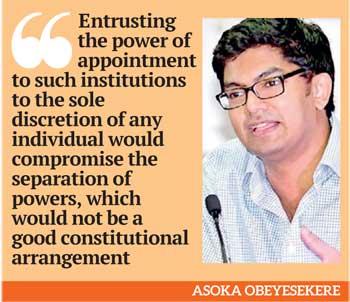 ordinary citizens should be done with due consideration, as it will have a lasting impact on the accountability of the Office of the President beyond the presidential term of any individual,” he emphasised.
ordinary citizens should be done with due consideration, as it will have a lasting impact on the accountability of the Office of the President beyond the presidential term of any individual,” he emphasised.
19A failed
“Firstly, the obvious point is 20A potentially creates an almighty president. The cardinal principle of Constitutions is you need to have a Constitution that unites the powers of Government,” said Dr. Kalana Senaratne, legal academic of the University of Peradeniya. He said 19A had been substituted by the principle of efficiency, which was the key idea supported by many people, especially the majority Sinhalese Buddhist electorate. He said the concept of independence of public officials had also received a huge blow by 20A. “My view is this is a logical extension of the 1978 Constitution,” he noted.
Regarding the ability of a dual citizen to enter parliament as proposed in 20A, Dr. Senaratne said he did not see this as a significant aspect because as a matter of principle dual citizens could sometimes have the interest of the country more at heart than other citizens. “There is a view in society that the 225 Members of Parliament are useless or that Parliament should be bombed. People should realise these are citizens of Sri Lanka, not dual citizens. So in principle, it is not a problem. The actual dual citizen issue came about because it was a point the previous regime targeted. Until then the question of dual citizenship was not really in the populations’ imagination. Perhaps this is the least significant provision or the change for me in 20A. There are far more serious changes that may happen,” he emphasised.
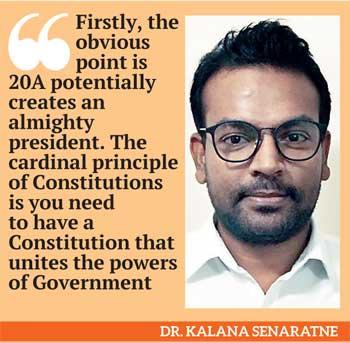 Dr. Senaratne said 20A was bound to happen because even though 19A contained important principles, its implementation proved inefficient. He noted the abolition of the 19A was waiting to happen and had been triggered with the 2019 Easter bombings and President Rajapaksa’s relatively efficient handling of the COVID-19 pandemic.
Dr. Senaratne said 20A was bound to happen because even though 19A contained important principles, its implementation proved inefficient. He noted the abolition of the 19A was waiting to happen and had been triggered with the 2019 Easter bombings and President Rajapaksa’s relatively efficient handling of the COVID-19 pandemic.
Commenting on the concentration of powers in one person, Dr. Senaratne said in both the presidential and parliamentary election people had voted for a particular individual. “There is a clear understanding that in whatever form it may come, 20A or a new Constitution, the idea was that one particular person, Gotabaya Rajapaksa, should have the powers to carry out his functions efficiently. I think when you say ‘people’ it is the Sinhala Buddhist majority who are clearly in favour of this amendment. The problem is not giving power to Gotabaya Rajapaksa, but giving powers to one individual . These are the decisions taken by the people not considering the larger picture,” he noted.
Monarchical system
“20A reinstates presidential powers which were removed from it and given to the Legislature by 19A,” Dr. Athulasiri Samarakoon of OUSL said. He said the most significant achievement of 19A was to make the President somewhat accountable to the Legislature 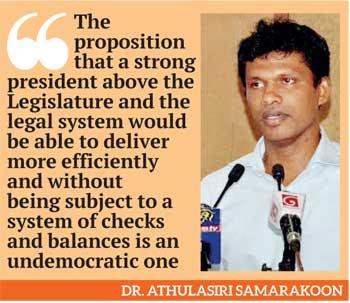 and the people, adding 20A pre-supposed the President, or Executive, should be the most powerful organ of Government, enabling it to discharge its functions regardless of accountability and with impunity. “The proposition that a strong president above the Legislature and the legal system would be able to deliver more efficiently and without being subject to a system of checks and balances is an undemocratic one,” Dr. Samarakoon added. He emphasised those who proposed this amendment hardly respected the ideas entrenched in liberal constitutionalism and seemed to prefer to restore a monarchical system under the guise of democracy. “If we create an omnipotent President it will be a heavy cost to democracy, the power of the people, the multi-party system and rule of the law,” he noted.
and the people, adding 20A pre-supposed the President, or Executive, should be the most powerful organ of Government, enabling it to discharge its functions regardless of accountability and with impunity. “The proposition that a strong president above the Legislature and the legal system would be able to deliver more efficiently and without being subject to a system of checks and balances is an undemocratic one,” Dr. Samarakoon added. He emphasised those who proposed this amendment hardly respected the ideas entrenched in liberal constitutionalism and seemed to prefer to restore a monarchical system under the guise of democracy. “If we create an omnipotent President it will be a heavy cost to democracy, the power of the people, the multi-party system and rule of the law,” he noted.
From a sociological angle, a very powerful ethnically and religiously majoritarian ruler would be a hindrance to a pluralistic society. “In short, 20A is anti-liberal democratic and seems to strategically serve to restore an authoritarian system of governance.”

Add comment
Comments will be edited (grammar, spelling and slang) and authorized at the discretion of Daily Mirror online. The website also has the right not to publish selected comments.
Reply To:
Name - Reply Comment
On March 26, a couple arriving from Thailand was arrested with 88 live animal
According to villagers from Naula-Moragolla out of 105 families 80 can afford
Is the situation in Sri Lanka so grim that locals harbour hope that they coul
A recent post on social media revealed that three purple-faced langurs near t